 Shrink is an informal term for a mental health professional. Mental health professionals help you understand your psychological, emotional, and behavioural difficulties better, and take care of your mental health. There are several kinds of mental health professionals: - Psychiatrist - has an MBBS degree, and an MD degree in psychiatry. They give a diagnosis, prescribe medicines for mental illness, and usually work in a hospital or their private practice. - Clinical Psychologist – has an MPhil degree in Clinical Psychology. They can conduct psychological tests, give a diagnosis, and also give therapy – but not prescribe medical treatments. They may work in a hospital or private practice. - Counselling Psychologist - has an MA degree or specialised diploma in Counselling Psychology. They work with emotional distress and dysfunction – and do not prescribe medical treatments. They can work with mental health organisations or run their private practice. - Mental Health Social Worker - has a Masters degree in Social Work, with specialisation in mental health concerns. They work with communities and help people understand the psychological impact of socio-cultural issues or connect them to the mental health services.
Shrink is an informal term for a mental health professional. Mental health professionals help you understand your psychological, emotional, and behavioural difficulties better, and take care of your mental health. There are several kinds of mental health professionals: - Psychiatrist - has an MBBS degree, and an MD degree in psychiatry. They give a diagnosis, prescribe medicines for mental illness, and usually work in a hospital or their private practice. - Clinical Psychologist – has an MPhil degree in Clinical Psychology. They can conduct psychological tests, give a diagnosis, and also give therapy – but not prescribe medical treatments. They may work in a hospital or private practice. - Counselling Psychologist - has an MA degree or specialised diploma in Counselling Psychology. They work with emotional distress and dysfunction – and do not prescribe medical treatments. They can work with mental health organisations or run their private practice. - Mental Health Social Worker - has a Masters degree in Social Work, with specialisation in mental health concerns. They work with communities and help people understand the psychological impact of socio-cultural issues or connect them to the mental health services. 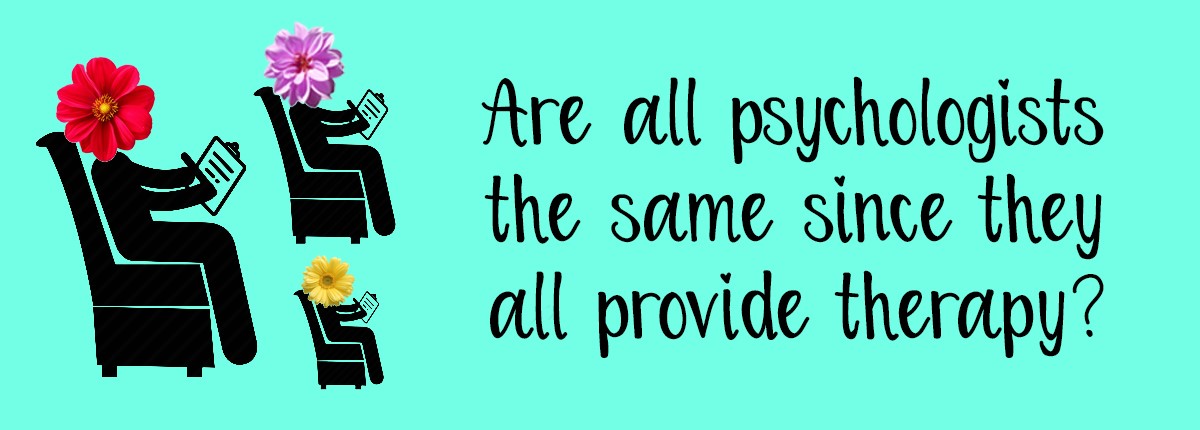 Like different doctors for different illnesses, there could be different types of psychologists too. - Child psychologists specialise in working with children, and adolescents. - Psychologists may also specialise in couple and family therapy. - Trauma-informed therapists are trained in working sensitively with trauma and dealing with the overwhelming emotions that come with it. - Queer affirmative therapists specialise in working with individuals with the LGBTQIA+ community and understand their specific concerns and struggles. - Expressive arts therapists may work with different types of art forms including painting, dance, theatre, or music and prove to be beneficial for people who don’t prefer just talk therapy.
Like different doctors for different illnesses, there could be different types of psychologists too. - Child psychologists specialise in working with children, and adolescents. - Psychologists may also specialise in couple and family therapy. - Trauma-informed therapists are trained in working sensitively with trauma and dealing with the overwhelming emotions that come with it. - Queer affirmative therapists specialise in working with individuals with the LGBTQIA+ community and understand their specific concerns and struggles. - Expressive arts therapists may work with different types of art forms including painting, dance, theatre, or music and prove to be beneficial for people who don’t prefer just talk therapy. 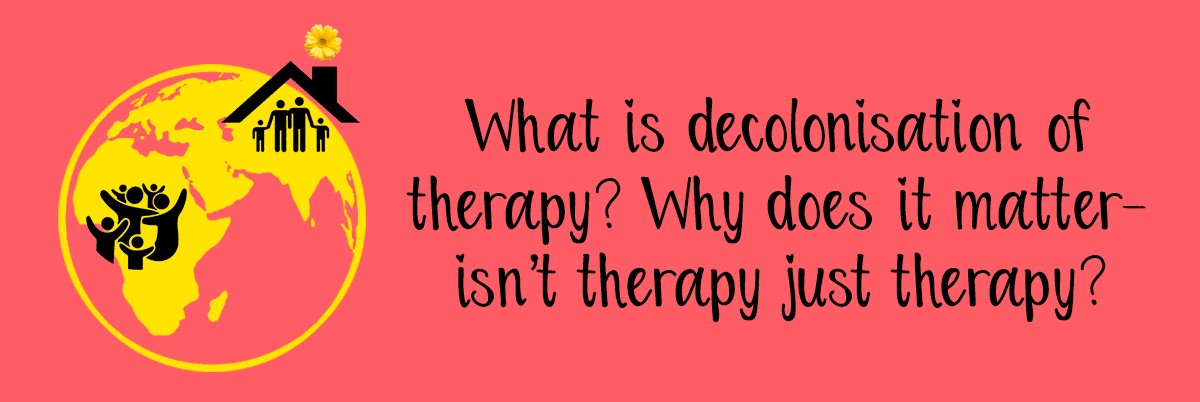 Decolonisation of therapy acknowledges the reality that our emotional distress is caused not only by our individual experiences but also our social contexts. It means that therapists understand that every culture, traditional systems, and their policies shape our thoughts, experiences and our healing processes differently — for example, your experiences and struggles as an Indian in the US will require a different understanding and healing processes, than those of an American national in the US. Gender, sexuality, caste, class, religion, race, nationality, and other identities you recognize, produce some contexts that contribute to our psychological health and this informs the therapeutic process.
Decolonisation of therapy acknowledges the reality that our emotional distress is caused not only by our individual experiences but also our social contexts. It means that therapists understand that every culture, traditional systems, and their policies shape our thoughts, experiences and our healing processes differently — for example, your experiences and struggles as an Indian in the US will require a different understanding and healing processes, than those of an American national in the US. Gender, sexuality, caste, class, religion, race, nationality, and other identities you recognize, produce some contexts that contribute to our psychological health and this informs the therapeutic process.  We feel sad when things don’t go as we expect them to go, or when we feel disappointed in something; it upsets us and makes us feel bad, but it is usually short-lived. Depression on the other hand, is a constant, prolonged state. Depression feels like a heavy grey cloud of sadness which just sits on our head, moves with us, and makes us feel bad, hopeless, and negative about ourselves, other people around us, and our world. It’s the same with anxiety and worrying too much — anxiety forces us to remain in a state of constant worry, keeps us on guard at all times, makes us think of different scenarios imagining the worst, and keeps coming up with new ‘what ifs’ to keep us on our toes, and exhausts us.
We feel sad when things don’t go as we expect them to go, or when we feel disappointed in something; it upsets us and makes us feel bad, but it is usually short-lived. Depression on the other hand, is a constant, prolonged state. Depression feels like a heavy grey cloud of sadness which just sits on our head, moves with us, and makes us feel bad, hopeless, and negative about ourselves, other people around us, and our world. It’s the same with anxiety and worrying too much — anxiety forces us to remain in a state of constant worry, keeps us on guard at all times, makes us think of different scenarios imagining the worst, and keeps coming up with new ‘what ifs’ to keep us on our toes, and exhausts us. 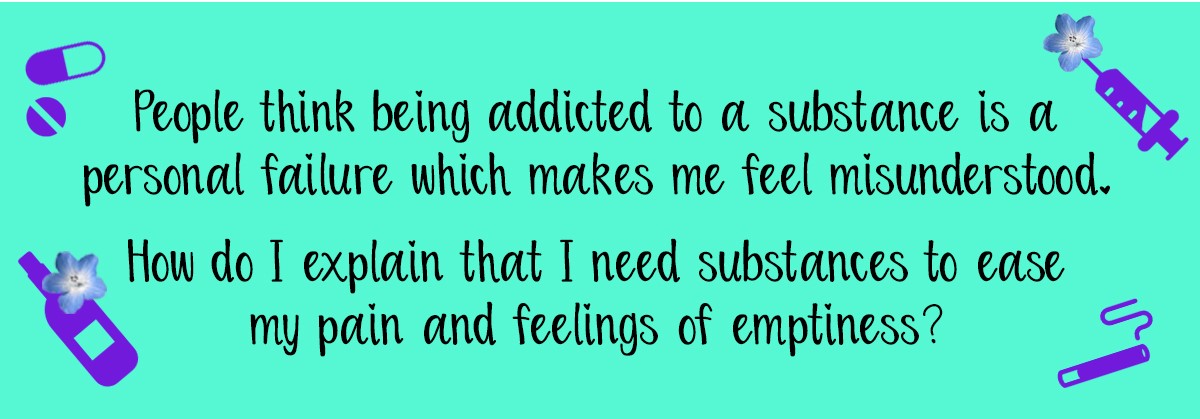 Talking about your substance use to someone can feel tiring because a lot of people can be judgmental and insensitive. What many of us don’t understand is that addiction or dependence can be a result of trauma or neglect or hard emotional experiences. Therefore, in a safe space, your therapist will understand that substances provide you the warmth and care which fill a void in your life. Talking about these emotions in therapy will also help you to accept yourself, be kind to yourself, and understand that addiction is not your personal failure; and even if people choose to not understand after this, you will know, and not judge yourself for it.
Talking about your substance use to someone can feel tiring because a lot of people can be judgmental and insensitive. What many of us don’t understand is that addiction or dependence can be a result of trauma or neglect or hard emotional experiences. Therefore, in a safe space, your therapist will understand that substances provide you the warmth and care which fill a void in your life. Talking about these emotions in therapy will also help you to accept yourself, be kind to yourself, and understand that addiction is not your personal failure; and even if people choose to not understand after this, you will know, and not judge yourself for it.  When you Google your symptoms, and use internet tests, it might give you an answer but there is no guarantee of how accurate or appropriate that answer is. Those answers are not reliable and may do more harm than good. While we understand that going to a psychiatrist or a clinical psychologist to get a diagnosis can sometimes be costly, that is definitely a better way to go ahead with a diagnosis, if one is needed. Use the internet for awareness not treatment.
When you Google your symptoms, and use internet tests, it might give you an answer but there is no guarantee of how accurate or appropriate that answer is. Those answers are not reliable and may do more harm than good. While we understand that going to a psychiatrist or a clinical psychologist to get a diagnosis can sometimes be costly, that is definitely a better way to go ahead with a diagnosis, if one is needed. Use the internet for awareness not treatment.  A change in their behaviour patterns such as eating habits, sleeping habits, socialising habits, and managing of their emotions, can often be indicative of a mental health crisis. To diagnose the nature of the crisis we need to consult a psychiatrist or a clinical psychologist. How can we help? Often, people fear getting a diagnosis because of the stigma attached to psychiatric or mental illness labels. Hence, we should not overlook the signs of someone’s changing mental health, and help them in their tough times by assisting them in accessing a mental health professional, and being present for them in an empathetic manner.
A change in their behaviour patterns such as eating habits, sleeping habits, socialising habits, and managing of their emotions, can often be indicative of a mental health crisis. To diagnose the nature of the crisis we need to consult a psychiatrist or a clinical psychologist. How can we help? Often, people fear getting a diagnosis because of the stigma attached to psychiatric or mental illness labels. Hence, we should not overlook the signs of someone’s changing mental health, and help them in their tough times by assisting them in accessing a mental health professional, and being present for them in an empathetic manner.  Therapy can sometimes be a little expensive because therapists undergo a lot of specialised training to finally start practicing. The cost of therapy can range from anywhere between Rs. 50 to even Rs. 4000. But don’t assume you cannot afford therapy. There are many therapists and organisations which offer therapy services for no charge, or offer sliding scales and even pay what you can. Also, the quality of therapy is not determined by the price. A high therapist’s fee does not mean they are better; it can simply mean that they have more years of experience or their specialisation is exclusive.
Therapy can sometimes be a little expensive because therapists undergo a lot of specialised training to finally start practicing. The cost of therapy can range from anywhere between Rs. 50 to even Rs. 4000. But don’t assume you cannot afford therapy. There are many therapists and organisations which offer therapy services for no charge, or offer sliding scales and even pay what you can. Also, the quality of therapy is not determined by the price. A high therapist’s fee does not mean they are better; it can simply mean that they have more years of experience or their specialisation is exclusive. 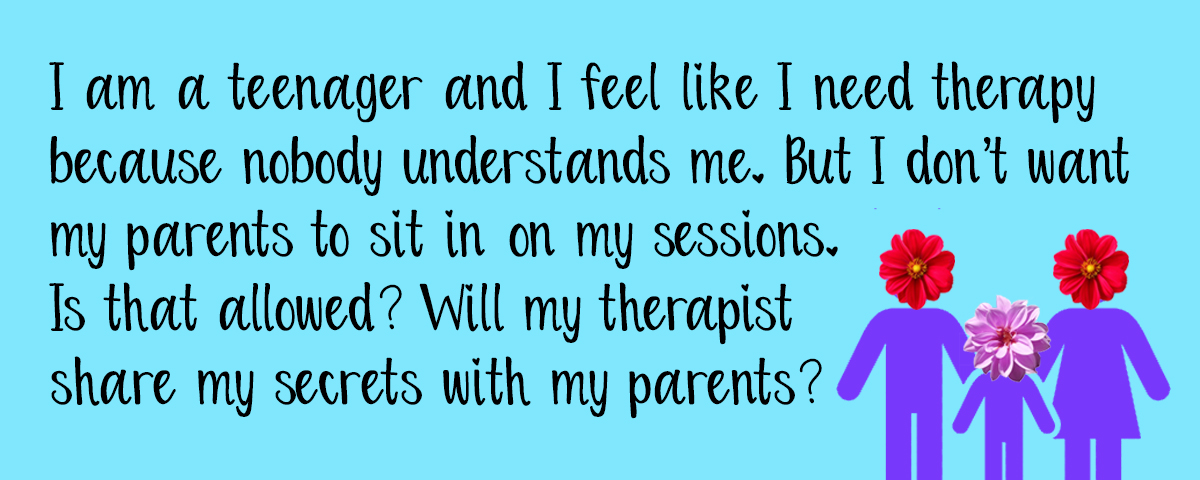 If you are a minor, and feel like you need therapy, it’s completely okay. While you might require the initial permission from your parents for going to therapy (because you’re financially dependent on them), they won’t be required to sit in your sessions. They will only be reached out to when absolutely necessary (for example, in case of potential harm to self of others). Your parents might be made to sign a document of guardianship, but this does not mean they can ask your therapist for your secrets; your secrets are safe with your therapist.
If you are a minor, and feel like you need therapy, it’s completely okay. While you might require the initial permission from your parents for going to therapy (because you’re financially dependent on them), they won’t be required to sit in your sessions. They will only be reached out to when absolutely necessary (for example, in case of potential harm to self of others). Your parents might be made to sign a document of guardianship, but this does not mean they can ask your therapist for your secrets; your secrets are safe with your therapist.  With the changes COVID brought, therapy has largely been shifted to online platforms. Online therapy has its own advantages and disadvantages. It makes therapy accessible for those who cannot travel, or reach out in person. But sometimes it can feel less personal because you don’t share the space physically, but your therapist will make sure that you feel safe even if it’s virtual.
With the changes COVID brought, therapy has largely been shifted to online platforms. Online therapy has its own advantages and disadvantages. It makes therapy accessible for those who cannot travel, or reach out in person. But sometimes it can feel less personal because you don’t share the space physically, but your therapist will make sure that you feel safe even if it’s virtual.  Self-care means that you are taking out time to take care of yourself, and extending kindness towards yourself. In our daily routines, we often forget to do it consciously because our mental health is not visible like our physical health; but both of them need equal care as they are dependent on each other. It can be done by the littlest of things like going easy on yourself, eating properly, getting enough hours of sleep, exercise, taking out time for your hobbies, listening to your favourite music, drinking enough water, taking time off from work or social media, spending enough time with our loved ones or playing with your pet. Self-care will be good for you because it will nourish your emotional self and help you to be compassionate and empathetic towards yourself, something that we forget to do sometimes.
Self-care means that you are taking out time to take care of yourself, and extending kindness towards yourself. In our daily routines, we often forget to do it consciously because our mental health is not visible like our physical health; but both of them need equal care as they are dependent on each other. It can be done by the littlest of things like going easy on yourself, eating properly, getting enough hours of sleep, exercise, taking out time for your hobbies, listening to your favourite music, drinking enough water, taking time off from work or social media, spending enough time with our loved ones or playing with your pet. Self-care will be good for you because it will nourish your emotional self and help you to be compassionate and empathetic towards yourself, something that we forget to do sometimes. 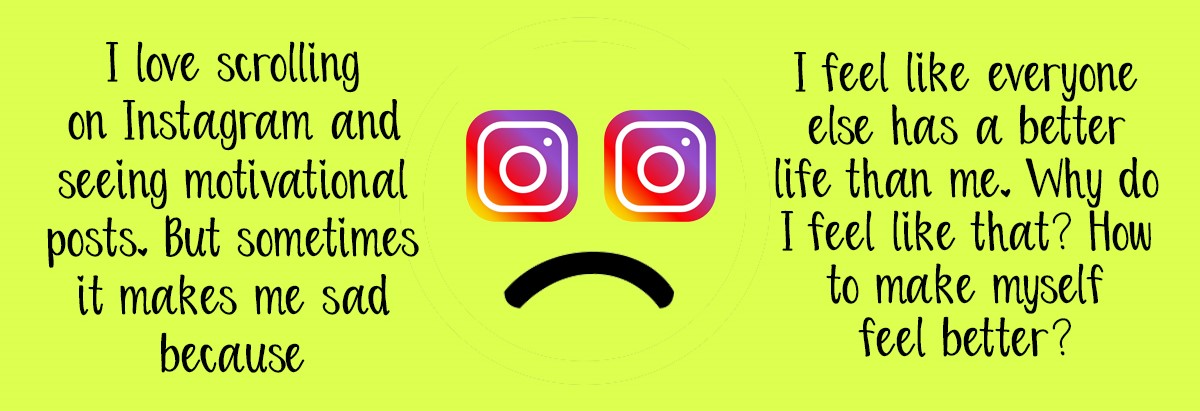 Social media has an interesting relationship with our mental health. Sometimes, it can be your sources of entertainment, positivity, and motivation, whereas on other days, it might stress us out. When you scroll through social media, it is important that you remember that everyone is only showing the best parts of their lives; it’s not the full truth about anybody’s life. One way to make yourself feel better about your Instagram (or social media) feed is to create a customised feed for yourself. Follow pages or people who inspire you, entertain you, and make you feel good. Follow topics which give you knowledge instead of stressing you out. Make your feed according to your own ‘feel-good’ vibes. This does not mean tuning out reality or those things that are politically complex. But it means doing so in a manner that makes you aware rather than helpless or hopeless.
Social media has an interesting relationship with our mental health. Sometimes, it can be your sources of entertainment, positivity, and motivation, whereas on other days, it might stress us out. When you scroll through social media, it is important that you remember that everyone is only showing the best parts of their lives; it’s not the full truth about anybody’s life. One way to make yourself feel better about your Instagram (or social media) feed is to create a customised feed for yourself. Follow pages or people who inspire you, entertain you, and make you feel good. Follow topics which give you knowledge instead of stressing you out. Make your feed according to your own ‘feel-good’ vibes. This does not mean tuning out reality or those things that are politically complex. But it means doing so in a manner that makes you aware rather than helpless or hopeless.  Feeling purposeless can be a very heavy emotion, which sometimes sits on the chest and makes us feel sad and mechanical. One of the most important things to remember at such times is that this does not have to be permanent. In such situations, what often helps is creating hope for yourself. It does not have to be a big or extraordinary thing; it can be something as little as getting a new plant for yourself and committing to taking care of that plant. In that moment, the purpose of your life would be to provide a healthy life for your plant, and that can make you feel better, at least for a little while. You might start taking care of yourself more, because you’re responsible for the plant; in this way, smaller steps can sometimes create a ripple effect of hope. There are different things that work for different people; for some, taking care of their pet might provide purpose to their life, and for others, waking up another day might be provide purpose to their life. Therapy would ease the process of creating hope for yourself, and slowly but eventually help heal your pain.
Feeling purposeless can be a very heavy emotion, which sometimes sits on the chest and makes us feel sad and mechanical. One of the most important things to remember at such times is that this does not have to be permanent. In such situations, what often helps is creating hope for yourself. It does not have to be a big or extraordinary thing; it can be something as little as getting a new plant for yourself and committing to taking care of that plant. In that moment, the purpose of your life would be to provide a healthy life for your plant, and that can make you feel better, at least for a little while. You might start taking care of yourself more, because you’re responsible for the plant; in this way, smaller steps can sometimes create a ripple effect of hope. There are different things that work for different people; for some, taking care of their pet might provide purpose to their life, and for others, waking up another day might be provide purpose to their life. Therapy would ease the process of creating hope for yourself, and slowly but eventually help heal your pain.  Feeling happy and positive all the time is a slightly unrealistic goal. Emotions are like waves, they switch between highs and lows, but always remember that they will pass. The pressure to feel happy all the time would mean that you are not allowing yourself to feel all your emotions freely. Good mental health is when you are able to recognise, feel and understand all the emotions which come to you and confront the heavier ones with some resilience. Changing emotions is a consistent part of our lives, and accepting this fact can help you to understand your mental health better.
Feeling happy and positive all the time is a slightly unrealistic goal. Emotions are like waves, they switch between highs and lows, but always remember that they will pass. The pressure to feel happy all the time would mean that you are not allowing yourself to feel all your emotions freely. Good mental health is when you are able to recognise, feel and understand all the emotions which come to you and confront the heavier ones with some resilience. Changing emotions is a consistent part of our lives, and accepting this fact can help you to understand your mental health better.  Trauma can be any significant event, or multiple events which have had a lasting impact on your emotions and mental health. No trauma is big or small, it should not be compared. It can be a big event which altered your life in some way, or it can be repeated smaller acts such as heartbreaks, parental neglect, invalidation of your emotions, or emotional hurt. Sometimes, we might forget traumatic memories, especially if our trauma occurred in our childhood because it is very painful to remember. Therefore signs of trauma may include dissociation, hyper-vigilance, depression, anxiety, flashbacks, chronic pain, hopelessness, numbing of emotional/physical pain, reduced attention span, reduced concentration, substance use, amongst others. Looking out for these signs in our or other people’s behaviours can help. Once we recognise and acknowledge these signs, therapy is an effective and helpful way of understanding our trauma better, and healthily navigating the often overwhelming emotions associated with it.
Trauma can be any significant event, or multiple events which have had a lasting impact on your emotions and mental health. No trauma is big or small, it should not be compared. It can be a big event which altered your life in some way, or it can be repeated smaller acts such as heartbreaks, parental neglect, invalidation of your emotions, or emotional hurt. Sometimes, we might forget traumatic memories, especially if our trauma occurred in our childhood because it is very painful to remember. Therefore signs of trauma may include dissociation, hyper-vigilance, depression, anxiety, flashbacks, chronic pain, hopelessness, numbing of emotional/physical pain, reduced attention span, reduced concentration, substance use, amongst others. Looking out for these signs in our or other people’s behaviours can help. Once we recognise and acknowledge these signs, therapy is an effective and helpful way of understanding our trauma better, and healthily navigating the often overwhelming emotions associated with it.
Here is where you can find some resources for help with mental health.
Utkarsha Jagga is a counselling psychologist, currently working with Another Light Counselling in Mumbai. Besides being a therapist, she finds herself equally invested in Taylor Swift's music, fighting for social justice, and watching cat videos on Instagram (in no particular order).
































































































































































































































































































































































































































































































































































































































































































































































































































































































































































































































































































































































































































